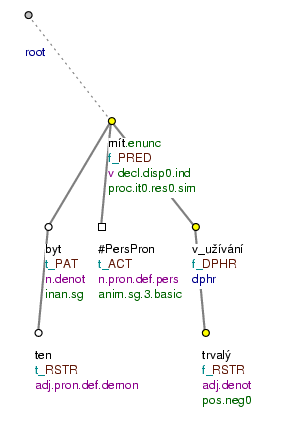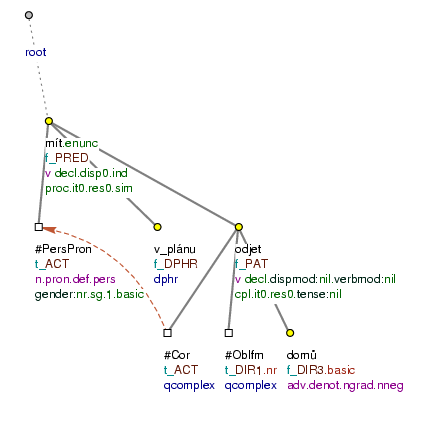By the term verbal idiom we mean an idiom, the governing part of which is a verb (usually a definite verb form), which can occur in the idiom in its whole paradigm.
Verbal idioms are a special type of multi-word predicates (see Section 9, "Multi-word predicates").
Verbal idioms are represented in the tectogrammatical tree according to the rules specified above - Section 8, "Idioms (phrasemes)". The governing part of a verbal idiom is always formed by a verb.
Examples:
Dával.PRED mi neustále najevo.DPHR svou převahu. (=He has been always showing me his superiority) Fig. 6.128
Házeli.PRED nám klacky pod nohy.DPHR (=They were putting obstacles in our way) Fig. 6.129
Běhal.PRED mu mráz po zádech.DPHR (=It was giving him the creeps)
Šel.PRED mu příkladem.DPHR (=He was an example to him)
Vše běží.PRED jako na drátkách.DPHR (=Everything is running smoothly)
The governing verb of an idiom can also require a modification which is not part of the idiomatic meaning. The node representing this modification is assigned an argument functor then.
Verbal idioms (that occurred in PDT) are captured in the valency lexicon by special valency frames. The exact requirements concerning the form of the dependent parts of an idiom are also specified in the valency frame (for details see Section 2.2.2, "Valency frames of idiomatic expressions (phrasemes) and complex predicates").
Valency of the dependent part of an idiom. Nodes with the functor DPHR usually have no further modifications depending on them. All modifications are usually part of the idiom, and therefore are represented by a single node with the functor DPHR. Exceptionally, there can be non-valency modifications that are not part of the idiom, depending on the node with the functor DPHR. This concerns especially nodes representing restrictive attributes (the functors RSTR or APP) that can have different lexical content in different instances of the given idiom. The valency frame of the given idiomatic meaning of the verb contains the information which part of the idiom can be modified in this way. Compare:
-
mít něco v trvalém užívání (=to have the permanent use of sth)
The adjective trvalý (=permanent) in the expression mít něco v trvalém užívání is not part of the idiom (it can be omitted, replaced with adjective dlouhodobý, krátký (=long-term, short) etc.), therefore the adjective trvalý is represented as a node with the functor
RSTRdependent on the node with the functorDPHR. Compare Fig. 6.131.The valency frame for the verbal idiom mít v (nějakém) užívání (=to have the use of):
ACT(.1)DPHR(v-1[užívání.6])PAT(.4). (v-1[stopa.P6[:u#]]) -
brát něco na lehkou váhu (=to take sth lightly; lit. to_take sth on light weight)
The adjective lehký (=light) in the expression brát něco na lehkou váhu is part of the idiom and therefore the node for the dependent part of the idiom (with the functor
DPHR) has the t-lemma na_lehkou_váhu. Compare Fig. 6.130.The valency frame for the verbal idiom brát na lehkou váhu (=to take sth lightly):
ACT(.1)DPHR(na-1[váha:4[lehký:#]])PAT(.4;že[.v];.c).
The words that are part of the dependent part of the idiom usually have specific valency behaviour: a word that has - in its unmarked use - valency requirements either loses its valency properties in the idiom, or its modifications are considered dependent on the governing verb. Therefore the node with the functor DPHR is never assigned a valency frame. Compare:
-
Svatba je na spadnutí.
DPHR(=The wedding could any time now)The verbal noun spadnutí (=falling) completely loses its valency in the idiom svatba je na spadnutí.
-
Mám v plánu.
DPHRodejít. (=I am planning ot leave)In the expression mám v plánu odejít we do not consider the infinitive odejít (=to leave) as dependent on the noun plán (=plan) (which is assigned the functor
DPHRhere), but we represent it as dependent on the governing verb mít (=to have) with the functorPAT. Compare Fig. 6.132.The valency frame of the verbal idiom mít v plánu:
ACT(.1)DPHR(v-1[plán:S6])PAT(.4;.f;že[.v]).
Borderline cases with verbal idioms. For details on borderline cases with verbal idioms see Section 9.4, "Borderline cases with multi-word predicates".
Figure 6.128. Verbal idiom
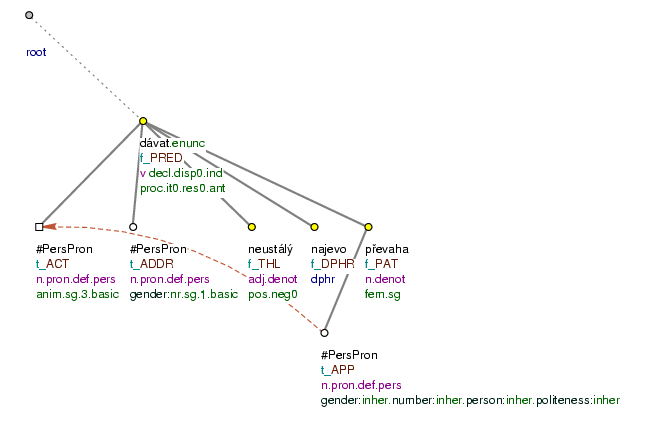
Dával mi neustále najevo svou převahu. (=lit. (He) was_giving me all_the_time clear his superiority)
Figure 6.129. Verbal idiom
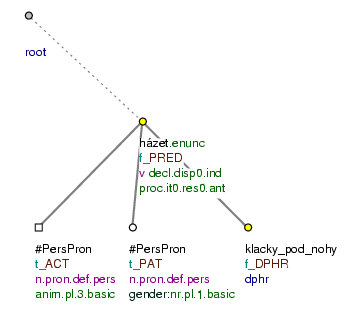
Házeli nám klacky pod nohy. (=lit. (They) were_throwing us sticks under feet)
Figure 6.130. Verbal idiom
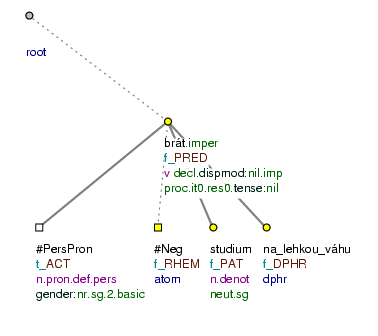
Neber studium na lehkou váhu. (=lit. Don't_take (your) study on light weight)
